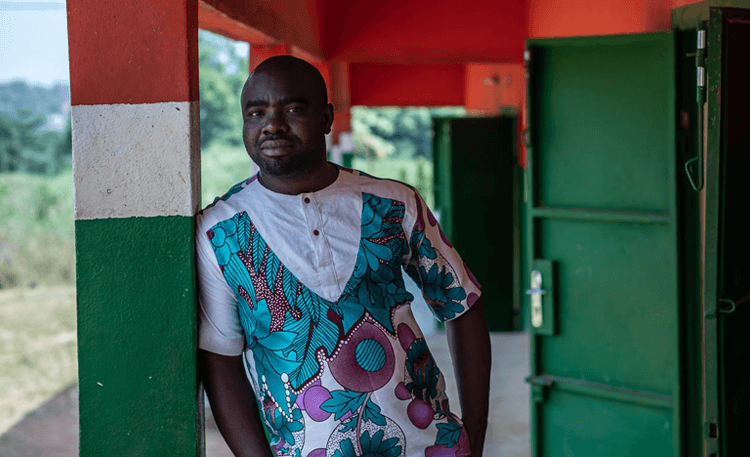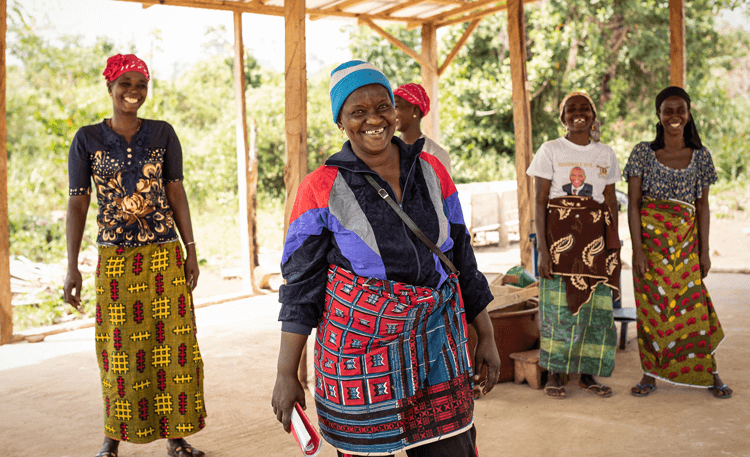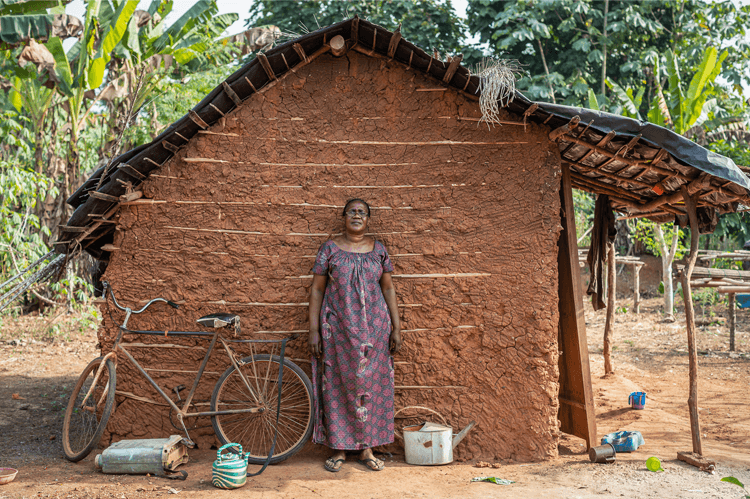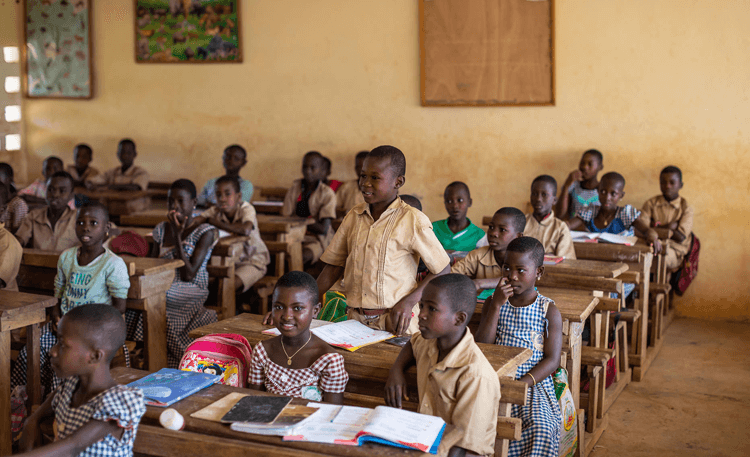by Martine Parry
Are Easter eggs ‘luxury items’ that should not be indulged in during this current global crisis? Senior Media Manager, Martine Parry reflects on her recent trip to Côte d’Ivoire and explains why choosing Fairtrade Easter eggs now is more important than ever.
‘Who wants to be a cocoa farmer when they grow up?’ I ask a packed, mixed class of smartly turned out primary school children, deep in the lush cocoa lands of western Côte d’Ivoire. Only two boys bashfully raise their hands.
One brave little boy puts up his hand and announces he wants to be the next president of the country so he can change things for the better.
‘But why don’t you want to be cocoa farmers like your parents?’ I ask the class.
‘Because cocoa farming is so very hard’, the children explain. They’d rather move to the capital Abidjan, or Abengourou in the East, and follow their dreams of becoming engineers and teachers.
The school’s intake is from the surrounding cocoa farming communities, and most of the farmers are members of a Fairtrade certified co-operative that doesn’t currently sell its cocoa on Fairtrade terms due to a lack of market demand, however they nonetheless receive regular training from Fairtrade Africa.
When you hear about the children’s career aspirations, it’s easy to forget that cocoa growing communities like these in Côte d’Ivoire and Ghana, where most of the world’s cocoa beans are grown by approximately two million smallholder farmers, still live in grinding poverty.
New Fairtrade research shows that the average cocoa farmer earns under 75p a day, and women earn as little as 23p. That’s not enough to cover the costs of food, water, housing, education, healthcare, transport, clothing or any other essential needs, let alone putting aside money for the future.
Maybe it’s not then surprising that these young girls and boys see no future in cocoa farming. After all, we all look to create a better life for ourselves, no matter where we live.
As a nation of chocolate lovers, consuming more per person than any other European country, surely we should expect more from an industry that’s worth at least £4 billion each year. Surely we have a responsibility to show solidarity for the people who grow something we consider to be a luxurious treat, particularly in the run up to Easter, when we traditionally exchange chocolate eggs with our family as a sign of affection.
Dig a bit deeper, and it quickly becomes apparent that the cycle of poverty brings with it many symptoms and side effects, one of which is inequality.
‘Women face many barriers to becoming autonomous – it would be very satisfying for me if it were possible for more women’, Nomel Meledje, the co-operative’s gender coordinator tells me. ‘I was actually appointed to tackle child labour, but quickly realised that helping children fight child labour involves helping the women too, you always need to start with women.’

But things are slowly changing within the local community. Nomel tells me that women are getting more support from the co-operative to improve their business skills, save money and plan for the future.
I ask him in what way does he think women approach the business of farming differently to men. “When a man has money, he searches for a second wife and thinks about expansion, whereas when a woman earns her own income, she puts the needs of the whole family before her own.”
Far from being a ‘male crop’ when men do all the ‘hard work’ as is commonly assumed, women’s labour is crucial to cocoa production. Female cocoa farmers’ working hours also exceed those of men by nearly 30 percent. This is set against the fact that just 25 percent of women cocoa farmers in Cote d’Ivoire own land. Even those who do own their land tend to have smaller, more remote and less productive farms. There is a further group of women who lack ownership and are ‘invisible’ because they don’t have the documentation needed to participate in farming programmes.
‘I’ve learned from this job that women are patient, determined and willing to struggle hard because this ensures the wellbeing of her whole family, it’s very touching’ Nomel observes.
Diakete Salimata, a 48-year cocoa farmer, business woman and mother of eight children who all attend school, says that before she was trained by Fairtrade Africa’s Women’s School of Leadership, she used to lack self-confidence. This affected the way she ran her business: ‘I had a real fear of speaking up and expressing my point of view, which slowed my leadership abilities’. ‘Sali’ studied alongside Amah, another female member of her co-operative, and with her support, she was able to overcome her anxieties and learn valuable new skills in financial management, entrepreneurship and diversification.
Sali now leads a group of local women to run a small cassava processing business which helps them earn extra money between cocoa harvests.

‘Our income went from nothing, to a little bit extra. Now we are saving money and we hope to use a portion to help our husbands provide for the whole family and pay for expansion of our farms. The extra money pays for seasonal farm labour, which is very helpful. This means we can grow more cocoa and increase our productivity and our income.’
“The Women’s School of Leadership helped in so many ways. It taught us how to talk to our husbands and take decisions together. In the past, our husbands sold the beans and didn’t show us any of the money generated by the sale of our cocoa beans. Now we know how to negotiate with our husbands and discuss properly, sharing information.’
Amah Kouao, who left school aged 11, agrees. ‘They told us we have value in ourselves, and the Fairtrade training was to unveil that value. I thought, I am uneducated, I didn’t go to school, how am I meant to start learning at my age? But our teacher Anne Marie told me that it doesn’t matter, just join anyway. So I went back to school at 60.’

‘We learned about self-confidence, budget management, but also Fairtrade Standards and how to plan our business activities, how to invest our savings in bank accounts. And we learned that we had value inside ourselves. We learned about the law too, both human and child rights.’
Salimata says she was taught about the power of teaming up with other women in business. ‘We now work together in synergy and this helps us feel empowered. We support each other, share our problems and find a common way through. I’ve completely changed my tune now we are working together as a unit and I pass these skills on to the other women every day. I used to see women’s role in the community differently, they were buried in the past, we didn’t know we had potential, we didn’t know we had value.’
Nomel adds: ‘Traditionally women were second class, but today they are volunteering for leadership roles and are more equal. Empowering women is actually helpful for everyone. If women can support their husbands financially when there’s a need for extra income, then that’s a good thing. In my role, I tell the women they can do as much as men, I encourage the men to ask the women’s opinion in terms of the farm.’
Unless young people in Côte d’Ivoire can see a future in cocoa where they can earn enough from the cocoa they grow, they will inevitably seek work elsewhere and stop farming. Fairtrade is working hard to secure a better deal for the farmers who grow the cocoa in our chocolate. Choose Fairtrade chocolate Easter eggs to give the next generation of cocoa famers a better future.
We do not yet know how this latest crisis (COVID-19) is going to affect cocoa farmers, but we do know that future of cocoa is already under threat because of these poor working conditions. Unless young people in Côte d’Ivoire can see a future where they can earn enough from the cocoa they grow, they will inevitably seek work elsewhere, away from farming. Fairtrade is working hard to secure a better deal for the farmers who grow the cocoa in our chocolate, which is more important now than ever, since the future has just been made even more uncertain. Choose Fairtrade chocolate Easter eggs to give the next generation of cocoa famers a more secure future.
You can read about our response to the pandemic and how it is affecting producers.
Support farmers this Easter by choosing Fairtrade.
Photography by Chris Terry
